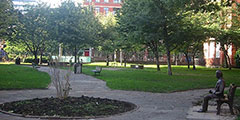“We can only see a short distance ahead, but we can see plenty there to be done.”
– Alan Turing
This life-size bronze statue was unveiled in 2001. Mathematician Alan Turing played a key role in defeating global fascism in the Second World War, helping to break the Nazis’ Enigma code. He is known as ‘the father of modern computing’.
Turing was Reader in Mathematics at the University of Manchester after the Second World War. He worked on computer programming and artificial intelligence, and his research contributed to the development of the first computers. The coded message on the plaque spells ‘Founder of Computer Science’. Sculptor Glynne Hughes buried his old computer below the memorial in tribute to Turing’s work. The statue is sited near University buildings in the Gay Village – important places in Turing’s life.
Turing holds an apple, recalling his death in 1954, aged 41. He apparently took his own life by eating an apple laced with cyanide, following distressing events in his life linked to his sexuality. Turing, a gay man when homosexuality was illegal in the UK, was arrested in 1951 for having a relationship with another man. He was prosecuted on charges of ‘gross indecency’ and sentenced to chemical castration.
From 1967 homosexuality was no longer illegal England and Wales, but only fully decriminalised in the UK in 2000. In 2009, UK Prime Minister Gordon Brown made a public apology: ‘on behalf of the British government, and all those who live freely thanks to Alan’s work, I am very proud to say: we’re sorry. You deserved so much better’.
The memorial recalls how intelligence and teamwork helped defeat fascism; the ground-breaking achievements of university research; and progress towards human rights and equality since Turing’s conviction. Manchester proudly remembers Turing’s life and legacy with this statue, the University’s Alan Turing Building, the Alan Turing Way and the Alan Turing Bridge.
Sackville Gardens also holds the Beacon of Hope memorial to those who live or have lived with HIV / AIDS. An annual vigil is held here as part of the Manchester Pride Festival.






 3 minutes
3 minutes